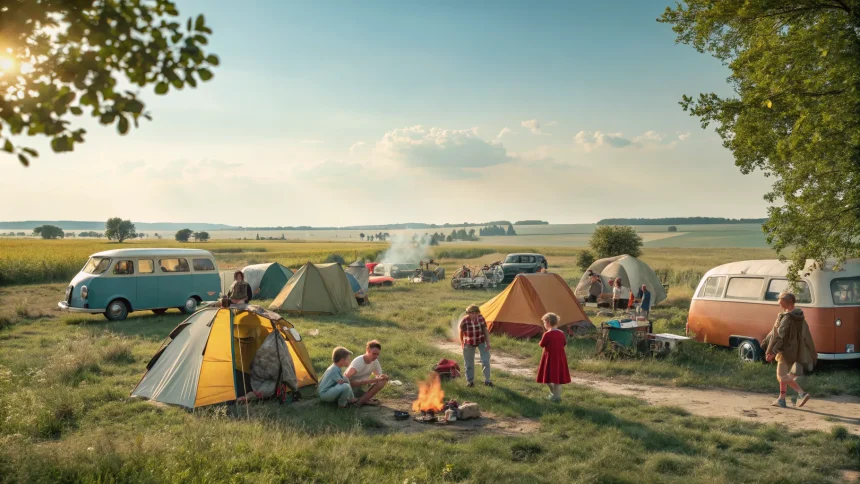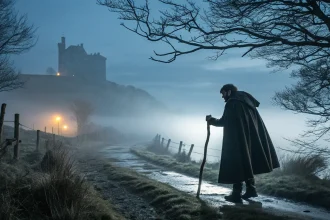On the outskirts of Leipzig, a loyal group of camping fans returns twice a year to pitch tents, swap stories, and keep a slice of East German life intact. About 150 families gather to remember shared rituals, old gear, and a community spirit shaped before 1990. Their goal is simple: keep traditions alive in a country that has changed fast.
The meetups offer a living archive of a culture that once filled summer calendars across the German Democratic Republic. Families haul vintage trailers, unpack enamelware, and cook recipes that recall long queues and longer summers. The reunion overlaps with a wider debate about memory, identity, and what people choose to preserve.
It’s been three decades since the reunification of Germany, but camping enthusiasts from the former East Germany allow themselves twice a year to relive the past and forget about how much has changed.
A Tradition Built on Community Camping
In the former East, vacation options were modest but social. Many families joined camping collectives linked to factories or neighborhood clubs. Plots were booked through unions. Gear was shared. Trips were planned months ahead, and a hard-won trailer became a badge of pride.
Those habits still shape the gatherings near Leipzig. Participants line up Soviet-era stoves next to modern coolers. Some tow small fiberglass caravans from the 1970s, known for their compact design. Others sleep in restored tents that survived decades in attics. The display is half campsite, half open-air museum.
Attendance stays steady, organizers say, because the event feels like home. People greet each other by first name. Kids learn how to repair canvas or tie guy lines. Younger campers, born after 1990, come to see what their parents talk about.
Memory, Nostalgia, and the DDR Debate
East German nostalgia—often called “Ostalgie”—has cycled through pop culture for years. It shows up in souvenir shops selling traffic-light figures, in food brands revived from old recipes, and in festivals where Trabants still draw cheers. Camping sits in that mix, though it brings fewer slogans and more routine.
Supporters say the reunions celebrate friendship and DIY skill, not politics. They argue the campsite gives people a safe space to share practical know-how and family history. Critics worry that rosy memories can blur harsh truths about the Stasi, shortages, and travel bans.
Both views appear around the campfire. Older campers talk about solidarity during lean times. Others remind the group that choice came late and dear. The result is a tradition with guardrails: honor the social ties, do not whitewash the state that shaped them.
Why Leipzig, and Why Now
Leipzig sits at a crossroads of old and new. It is a boom city with strong cultural roots in the East. Nearby campgrounds offer space, lakes, and easy rail access. That makes the twice-yearly meetups predictable and affordable for families spread across Saxony, Thuringia, and Brandenburg.
The timing also matters. More than 30 years after reunification, many original campers are retired. They have time to travel and teach. Their children are raising families and want practical, low-cost holidays. Camping meets both needs.
- Two gatherings per year anchor travel plans.
- About 150 families attend, rain or shine.
- Vintage gear and shared meals set the tone.
Economic and Cultural Ripples
The meetups bring quiet gains to local businesses. Hardware shops sell rope and tent pegs. Bakeries see weekend spikes. Small museums partner on displays. Campground owners say repeat visits help smooth slow months.
There is also a civic angle. Teachers and historians sometimes visit to record oral histories. Photos and gear are cataloged for exhibits on daily life in the East. The campsite becomes a classroom where memory can be checked and cross-checked in plain view.
What Comes Next
Organizers expect steady numbers, with younger families joining as costs rise for long-distance travel. Climate-conscious trips also help. Trains to Leipzig are frequent, and many campers pack light and share rides.
The bigger question is how the story gets told. If the reunions keep blending warmth with honesty, they could model how communities remember hard chapters without softening them. If they slip into nostalgia without context, the project risks losing trust.
For now, the tents go up, the kettles boil, and the talk stretches late. The tradition is humble, but the stakes feel real. Memory needs places to breathe, and twice a year, this field near Leipzig does the job.









